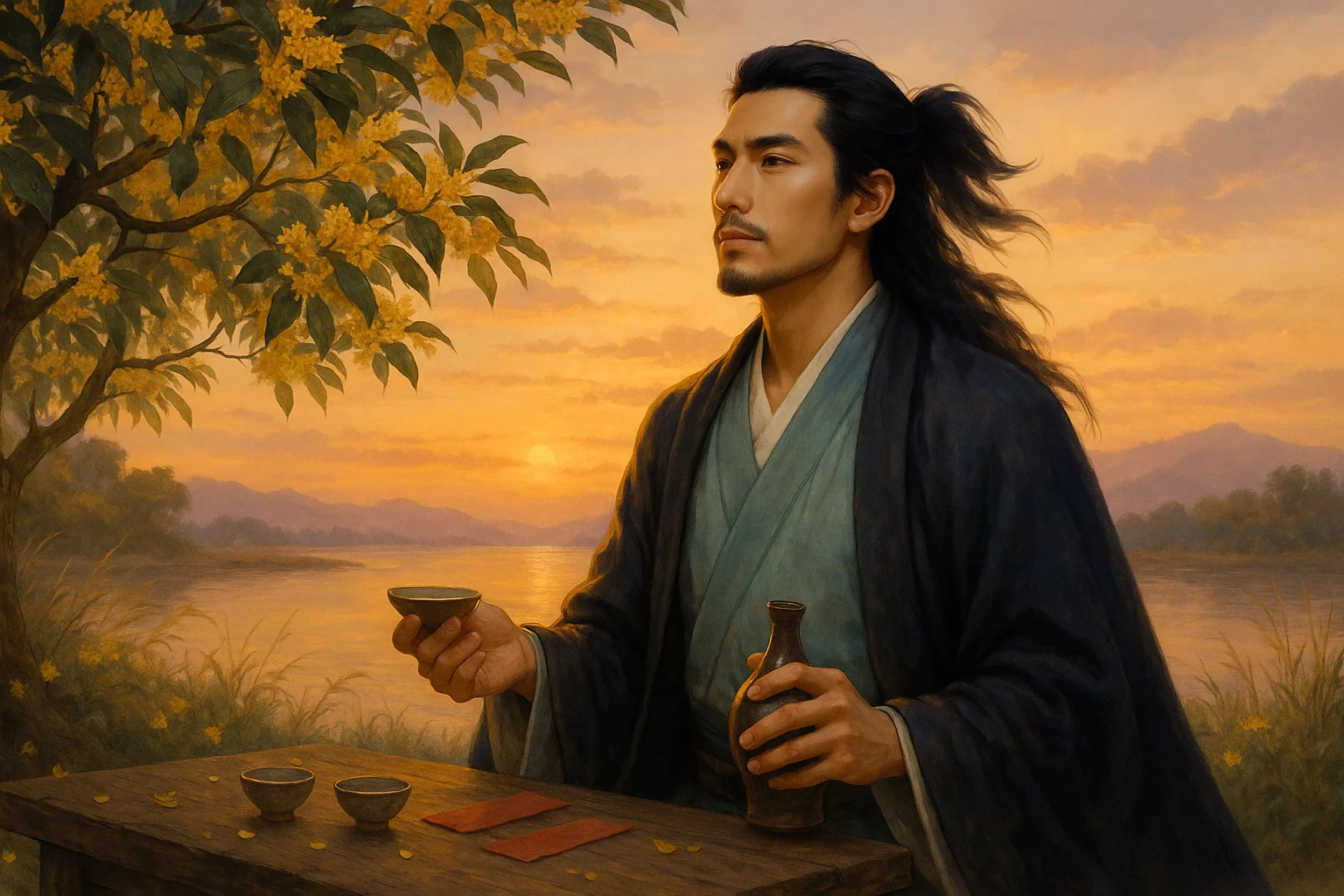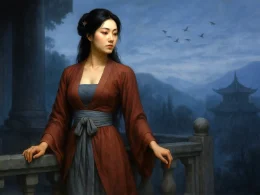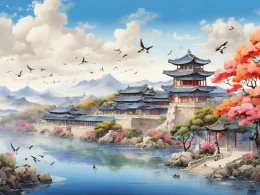A gallon of wine, a hog's leg in hand,
Braving wind and rain to cross the river—
What exhilaration!
Till Bai the Recluse summoned me,
With Lin the Hermit and Su the Sage,
Who yanked me back by force.
Su praised West Lake,
Like Lady West at her mirror,
Now thickly painted, now lightly adorned.
But those two lords
Just shook their heads,
Draining cup after cup.
White clouds drift o'er Tianzhu peaks—
A painted scroll unfolds,
Towering pavilions emerge.
I love the twin creeks east and west,
Their crisscrossing streams;
The two peaks north and south,
Their clouds piled high and low.
Lin demurred: "Rather
Seek the hidden fragrance wafting—
First pluck mume blooms on Lonely Hill!"
Wait for clear skies,
Then visit Jiaxuan—not too late!
For now, let's linger here.
Original Poem
「沁园春 · 斗酒彘肩」
斗酒彘肩,风雨渡江,岂不快哉!
被香山居士,约林和靖,与坡仙老,驾勒吾回。
坡谓西湖,正如西子,浓抹淡妆临镜台。
二公者,皆掉头不顾,只管衔杯。白云天竺去来,图画里、峥嵘楼观开。
刘过
爱东西双涧,纵横水绕;两峰南北,高下云堆。
逋曰不然,暗香浮动,争似孤山先探梅。
须晴去,访稼轩未晚,且此徘徊。
Interpretation
Composed during the Southern Song Dynasty, this ci poem embodies Liu Guo's profound admiration for Xin Qiji, expressed through a literary reverie rather than literal journey. The line "wait for clearing skies to visit Jiaxuan" reveals heartfelt longing, yet the poem unfolds as an imaginative detour—where Liu's planned stormy river-crossing to meet Xin is interrupted by visionary encounters with three poetic giants (Bai Juyi, Lin Bu, Su Shi) debating West Lake's beauty. Through their aesthetic dialogues, Liu celebrates poetry's timeless continuum while affirming his connection to nature, history, and cultural legacy.
First Stanza: "斗酒彘肩,风雨渡江,岂不快哉!被香山居士,约林和靖,与坡仙老,驾勒吾回。坡谓西湖,正如西子,浓抹淡妆临镜台。二公者,皆掉头不顾,只管衔杯。"
Dǒu jiǔ zhì jiān, fēng yǔ dù jiāng, qǐ bù kuài zāi! Bèi Xiāngshān jūshì, yuē Lín Héjìng, yǔ Pō xiān lǎo, jià lēi wú huí. Pō wèi Xīhú, zhèng rú Xīzǐ, nóng mǒ dàn zhuāng lín jìng tái. Èr gōng zhě, jiē diào tóu bù gù, zhǐ guǎn xián bēi.
A jug of wine, roasted pork shoulder,
crossing rivers in wind and rain—
what exhilaration!
But Bai Juyi of Fragrant Hills,
Lin Bu the hermit,
and immortal Su Dongpo
summoned me back.
Su declared: "West Lake mirrors Xishi—
whether light or heavy makeup,
she dazzles before her glass."
The other two shook their heads,
silently raising their cups.
The stanza erupts in kinetic ambition—"crossing rivers in wind and rain" (风雨渡江) channels frontier spirit, while "roasted pork shoulder" (彘肩) evokes feast-warrior camaraderie. The abrupt interception by "spirit-guides" (驾勒吾回) transforms physical journey into metaphysical symposium. Su Shi's makeup metaphor (浓抹淡妆) aestheticizes nature, yet Lin Bu and Bai Juyi's silent cup-raising (衔杯) becomes poetic resistance—a wordless critique of ornate description favoring experiential immediacy.
Second Stanza: "白云天竺去来,图画里、峥嵘楼观开。爱东西双涧,纵横水绕;两峰南北,高下云堆。逋曰不然,暗香浮动,争似孤山先探梅。须晴去,访稼轩未晚,且此徘徊。"
Bái yún Tiānzhú qù lái, tú huà lǐ, zhēng róng lóu guān kāi. Ài dōng xī shuāng jiàn, zòng héng shuǐ rào; liǎng fēng nán běi, gāo xià yún duī. Bū yuē bù rán, àn xiāng fú dòng, zhēng sì Gūshān xiān tàn méi. Xū qíng qù, fǎng Jiàxuān wèi wǎn, qiě cǐ pái huái.
Bai countered: "See Heavenly Bamboo Peak's clouds drift—
pagodas pierce painted skies!
I love twin east-west streams
crossing like woven threads,
north-south peaks stacked
with cloud-mounds high and low."
Lin Bu objected: "Floating plum scent
on Solitary Hill surpasses this—
go seek blossoms first!"
"Wait for clearing skies
to visit Jiaxuan—
not too late.
Linger here awhile."
The debate intensifies: Bai Juyi's panoramic vision ("twin streams" 双涧, "cloud-mounded peaks" 云堆) constructs landscape as monumental scroll, while Lin Bu's "floating plum scent" (暗香浮动) privileges olfactory intimacy over visual spectacle. The resolution—"linger here awhile" (且此徘徊)—suspends action in aesthetic contemplation, transforming procrastination into deliberate presence. "Clearing skies" (须晴去) operates as meteorological and metaphysical threshold—weather permitting, soul prepared.
Holistic Appreciation
Liu orchestrates a meta-poetic opera where West Lake becomes contested aesthetic territory. Su Shi's cosmetic metaphor, Bai Juyi's topographic grandeur, and Lin Bu's botanical subtlety represent competing artistic legacies. By having them "summon back" (驾勒吾回) the poet from his journey, Liu suggests that cultural inheritance inevitably interrupts personal ambition—the living must converse with the dead before proceeding.
The poem's brilliance lies in its paradoxical stillness: the promised "exhilaration" (岂不快哉) of stormy travel yields to suspended animation ("linger here awhile"). This pause embodies the Song literati's quintessential dilemma—between patriotic action (visiting Xin) and cultural stewardship (debating beauty). Liu resolves it through poetic synthesis: his "lingering" becomes the act that contains all actions.
Artistic Merits
- Gastronomic bravado
"Roasted pork shoulder" (彘肩) transforms feast into heroic fuel for impossible journeys. - Meteorological metaphysics
"Clearing skies" (须晴去) bridges weather patterns and spiritual readiness. - Olfactory minimalism
"Floating plum scent" (暗香浮动) defeats visual grandeur through understated elegance. - Summoned interruption
"Spirit-guides halted me" (驾勒吾回) externalizes artistic conscience as spectral intervention.
Insights
Liu's poem reveals cultural pilgrimage as circular journey. The planned visit to Xin Qiji (patriotic action) gets diverted into dialogue with past poets (cultural preservation), proving that serving one's country requires first honoring its artistic lineage.
The three poets' aesthetic debate models pluralistic beauty—Su Shi's painterly vision, Bai Juyi's geological scale, Lin Bu's botanical intimacy collectively argue that no single perspective monopolizes truth. For modern creators, this offers antidote to absolutism: great art thrives through respectful contention.
Ultimately, "linger here awhile" becomes radical act. In delaying his mission, Liu discovers that true homage lies not in reaching destinations but in deepening presence. The clearing skies he awaits may never come—yet in lingering, he builds the bridge between ancestors and heirs, between West Lake's waters and Xin Qiji's distant camp.
About the Poet

Liu Guo (刘过 1154 - 1206), a native of Taihe in Jiangxi, was a ci poet of the Bold and Unconstrained School (haofang pai) during the Southern Song Dynasty. Though he remained a commoner all his life, wandering the rivers and lakes, he associated with literary giants like Lu You and Xin Qiji. His ci poetry is impassioned and heroic, and his verse is vigorous and forceful. Stylistically close to Xin Qiji but even more unrestrained, Liu Guo became a central figure among Xin’s poetic followers.












